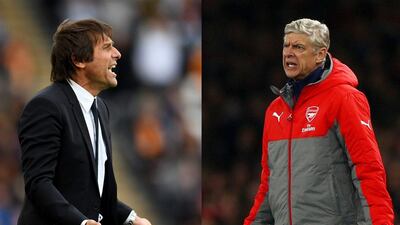When billionaire Roman Abramovich completed his takeover of Chelsea in June 2003, the landscape of English football changed forever.
The Russian was hungry for glory and he did not have any desire to be patient in his pursuit of it. Chelsea immediately set about challenging the Manchester United-Arsenal duopoly that had ruled the Premier League era, in turn forcing other clubs to follow their lead and opening the door for further foreign investment.
The rewards have been plentiful. Chelsea have established themselves as one of Europe’s biggest clubs, with the latest edition of the Deloitte Football Money League ranking them as the continent’s eighth-richest.
More importantly, they have added four Premier League titles, four FA Cups, the Uefa Champions League and the Europa League to their trophy cabinet under Abramovich’s ownership, while Antonio Conte’s side currently sit nine points clear at the top of the table ahead of Saturday’s London derby against Arsenal.
Their modus operandi has clearly been successful, then, but while it has won Chelsea silverware it has not always gained them friends.
One of their biggest critics in the last 13 or so years will be at Stamford Bridge on Saturday. In many ways, Arsene Wenger is Chelsea’s ideological antithesis and a man whose powerful position within his own club means it is largely run in the way he wishes.
__________________________________
Read more
■ Frank Lampard: A Chelsea legacy created by hard work and lots of goals
■ Predictions: Chelsea v Arsenal and the other Premier League matches
■ Diego Forlan column: Arsenal need to move on from Arsene Wenger
__________________________________
“It is one of the big problems in the modern game,” the Frenchman said earlier this season, in one of the many thinly-veiled digs he has aimed at Chelsea over the years.
“You’ve invested a lot of money into players because we’re paying more and more money. Then at the age of 20 you don’t usually get much money for any of the players, so the reflex is to stockpile the players. That’s not right.
“When you look at the number of loans that happen here and there, the whole system has to be thought about again because we have two kinds of solution in there.”
Chelsea, of course, have made a habit of snapping up youngsters and hastily sending them out for temporary spells elsewhere, an approach which jars with Wenger’s propensity to hand such players opportunities in the first team.
In terms of transfers more generally, Wenger has tended towards caution and, as some would see it, parsimony since Abramovich’s arrival. Chelsea, conversely, have unashamedly splashed spent heavily in pursuit of on-field success, even if they have recently begun to balance the books with regard to incoming and outgoing players.
Another area of divergence can be found in the dugout, where Wenger has now locked horns with 10 different managers in the Abramovich era. Two of those, Jose Mourinho and Guus Hiddink, each had two separate spells at Stamford Bridge.
Chelsea have never been afraid to pull the trigger on a manager who they perceive to be underachieving, a policy which stands in stark contrast to the stability and patience Arsenal have favoured during Wenger’s two decades in charge.
There are even clear differences when it comes to the pair’s playing styles. Chelsea have generally had the upper hand over Arsenal in recent seasons, with their tactical approach often based around ceding possession, getting men behind the ball and breaking at speed on the counter-attack.
There have been exceptions to the rule, most notably when Andre Villas-Boas’ team were beaten 5-3 in 2011, but matches between the sides have usually followed a similar pattern.
Saturday’s encounter at Stamford Bridge is unlikely to be any different, with the visitors in need of a victory to keep their slim title hopes alive. Wenger is running out of time to show that his way of doing things can bring back the glory days to Arsenal.
Defeatist Moyes hardly helping
In certain leagues across the world, most notably the Argentine Primera Division, relegation is not decided in the traditional way.
Instead of the teams with the lowest points tally being demoted at the end of the campaign, Argentine clubs are judged on a three-year rolling average, with the side who accumulates the fewest points in said period demoted to the second tier.
Were such a system employed in the English game, Sunderland would probably have taken their place in the Championship some time ago.
The perennial strugglers have now been battling against the drop for five consecutive seasons, with haphazard recruitment and a lack of direction in the boardroom making it difficult for them to clamber out of their rut.
The club’s current problems — Sunderland are bottom of the table and five points adrift of safety ahead of Saturday’s trip to Crystal Palace — therefore cannot be blamed entirely on manager David Moyes, but it is nevertheless difficult to escape the feeling that the Scot’s defeatism has compounded matters at the Stadium of Light this term.
“That’s where they’ve been every other year for the last four years, so why would it suddenly change?” Moyes said in August when asked whether his team were gearing up for another relegation fight.
“I don’t think you can hide the facts, that will be the case, yes. People will be flat because they are hoping that something is going to dramatically change — it can’t dramatically change, it can’t.”
The former Manchester United manager again attempted to play down expectations last month, warning supporters: “I’d be kidding you on if I said the players we’re hoping to bring in this month are going to make a big difference.”
Perhaps Moyes is right, but a little more positivity would not go amiss as he seeks to inspire his side to Premier League survival.
Follow us on Twitter @NatSportUAE
Like us on Facebook at facebook.com/TheNationalSport

